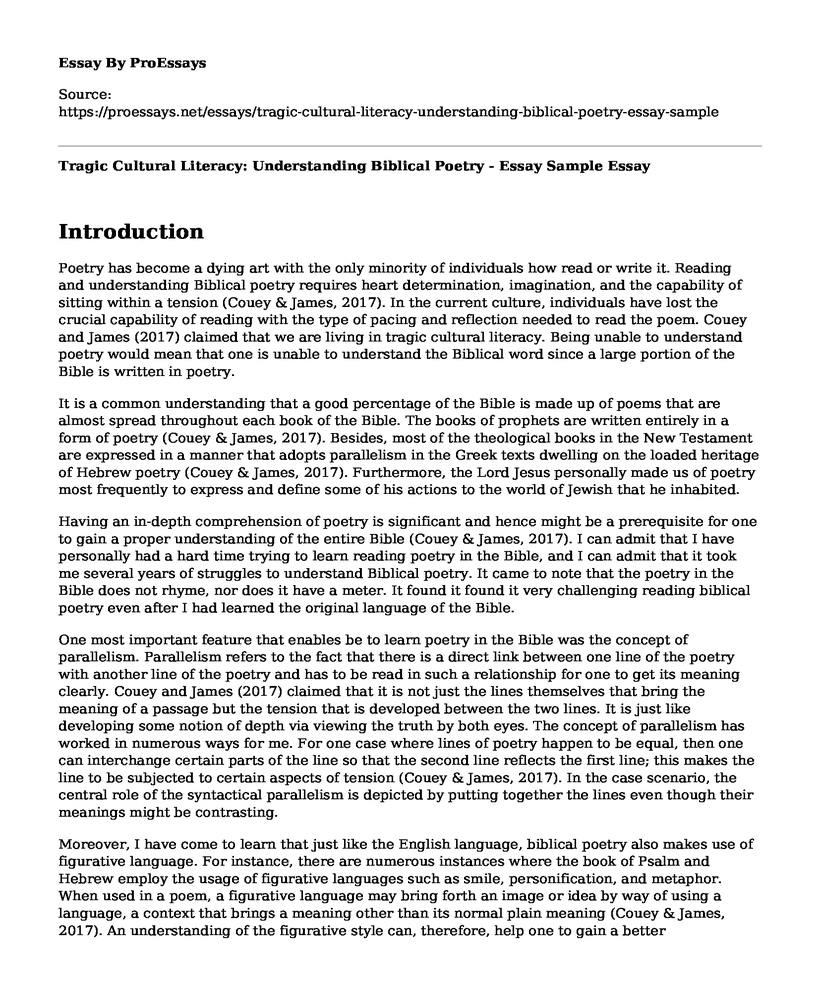Introduction
Poetry has become a dying art with the only minority of individuals how read or write it. Reading and understanding Biblical poetry requires heart determination, imagination, and the capability of sitting within a tension (Couey & James, 2017). In the current culture, individuals have lost the crucial capability of reading with the type of pacing and reflection needed to read the poem. Couey and James (2017) claimed that we are living in tragic cultural literacy. Being unable to understand poetry would mean that one is unable to understand the Biblical word since a large portion of the Bible is written in poetry.
It is a common understanding that a good percentage of the Bible is made up of poems that are almost spread throughout each book of the Bible. The books of prophets are written entirely in a form of poetry (Couey & James, 2017). Besides, most of the theological books in the New Testament are expressed in a manner that adopts parallelism in the Greek texts dwelling on the loaded heritage of Hebrew poetry (Couey & James, 2017). Furthermore, the Lord Jesus personally made us of poetry most frequently to express and define some of his actions to the world of Jewish that he inhabited.
Having an in-depth comprehension of poetry is significant and hence might be a prerequisite for one to gain a proper understanding of the entire Bible (Couey & James, 2017). I can admit that I have personally had a hard time trying to learn reading poetry in the Bible, and I can admit that it took me several years of struggles to understand Biblical poetry. It came to note that the poetry in the Bible does not rhyme, nor does it have a meter. It found it found it very challenging reading biblical poetry even after I had learned the original language of the Bible.
One most important feature that enables be to learn poetry in the Bible was the concept of parallelism. Parallelism refers to the fact that there is a direct link between one line of the poetry with another line of the poetry and has to be read in such a relationship for one to get its meaning clearly. Couey and James (2017) claimed that it is not just the lines themselves that bring the meaning of a passage but the tension that is developed between the two lines. It is just like developing some notion of depth via viewing the truth by both eyes. The concept of parallelism has worked in numerous ways for me. For one case where lines of poetry happen to be equal, then one can interchange certain parts of the line so that the second line reflects the first line; this makes the line to be subjected to certain aspects of tension (Couey & James, 2017). In the case scenario, the central role of the syntactical parallelism is depicted by putting together the lines even though their meanings might be contrasting.
Moreover, I have come to learn that just like the English language, biblical poetry also makes use of figurative language. For instance, there are numerous instances where the book of Psalm and Hebrew employ the usage of figurative languages such as smile, personification, and metaphor. When used in a poem, a figurative language may bring forth an image or idea by way of using a language, a context that brings a meaning other than its normal plain meaning (Couey & James, 2017). An understanding of the figurative style can, therefore, help one to gain a better understanding of biblical poetry.
Conclusion
Conclusively, understanding poems in the Bible may be challenging unless one has acquired sufficient knowledge and skills needed to interpret and hence comprehend the hidden meaning conveyed by every line in such poems. Understanding parallelism concepts and figurative language may help one to unearth the hidden meaning of biblical poetry.
References
Couey, J. & James, E. (2017). Biblical poetry and the art of close reading.2nd ed. New York, pp.63-64.
Cite this page
Tragic Cultural Literacy: Understanding Biblical Poetry - Essay Sample. (2023, May 25). Retrieved from https://proessays.net/essays/tragic-cultural-literacy-understanding-biblical-poetry-essay-sample
If you are the original author of this essay and no longer wish to have it published on the ProEssays website, please click below to request its removal:
- Literary Analysis Essay on Connection Between Gender and Class in Respectable Woman by Kate Chopin
- Change, Alienation, and Isolation in "The Metamorphosis" by Franz Kafka Essay
- Essay Example on Romeo and Juliet: Love Is a Chaotic Force of Nature
- Paper Example on Ovid: Celebrated Roman Poet and Artist's Influential Legacy
- Essay Example on the Representation of Chinese American Identity in The Joy Luck Club
- Paper Example on Exploring Civilization and Nature in Heart of Darkness
- Essay Example on Social Realism in Literature: Common People, Stories, and Places







